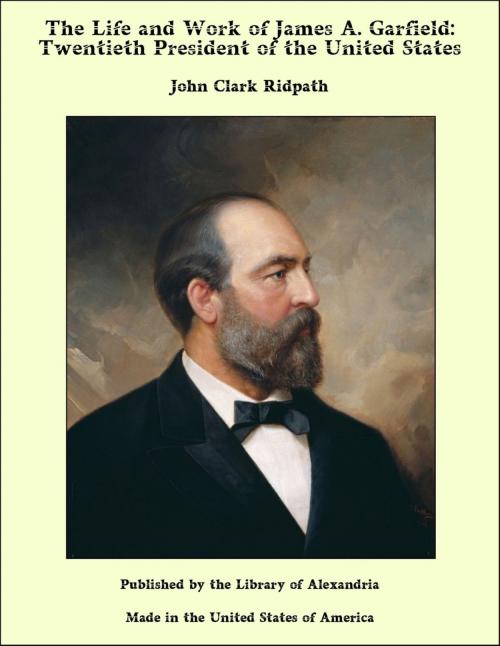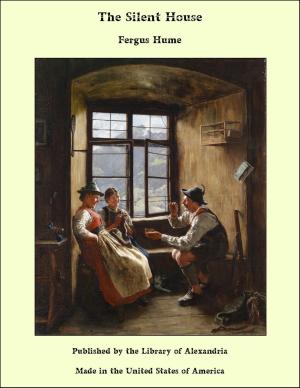The Life and Work of James A. Garfield: Twentieth President of the United States
Nonfiction, Religion & Spirituality, New Age, History, Fiction & Literature| Author: | John Clark Ridpath | ISBN: | 9781465626172 |
| Publisher: | Library of Alexandria | Publication: | March 8, 2015 |
| Imprint: | Language: | English |
| Author: | John Clark Ridpath |
| ISBN: | 9781465626172 |
| Publisher: | Library of Alexandria |
| Publication: | March 8, 2015 |
| Imprint: | |
| Language: | English |
Men, like books, have their beginnings. James Abram Garfield was born on the 19th day of November, 1831. His first outlook upon things was from a cabin door in Cuyahoga County, Ohio. The building was of rough logs, with mud between the cracks, to keep out the winter cold. The single room had a puncheon floor, and on one side a large fire-place, with a blackened crane for cooking purposes. In winter evenings, a vast pile of blazing logs in this fire-place filled the cabin with a cheerful warmth and ruddy glow. Overhead, from the rude rafters, hung rows of well-cured hams, and around the mud chimney were long strings of red-pepper pods and dried pumpkins. The furniture was as primitive as the apartment. A puncheon table, a clumsy cupboard, a couple of large bedsteads, made by driving stakes in the floor, some blocks for seats, and a well-kept gun, almost complete the catalogue. The windows had greased paper instead of glass; and, in rough weather, were kept constantly closed with heavy shutters. Stepping out of doors, one would see that the cabin stood on the edge of a small clearing of some twenty acres. On the south, at a little distance, stood a solid log barn, differing from the house only in having open cracks. The barn-yard had a worm fence around it, and contained a heavy ox-wagon and a feeding-trough for hogs. Skirting the clearing on all sides was the forest primeval, which, on the 19th of November, the frost had already transfigured with gold and scarlet splendors. Cold winds whistled through the branches, and thick showers of dry leaves fell rustling to the ground. Already the cabin shutters were closed for the winter; already the cattle munched straw and fodder at the barn, instead of roaming through the forest for tender grass and juicy leaves; already a huge wood-pile appeared by the cabin door. The whole place had that sealed-up look which betokens the approach of winter at the farm-house. The sun rose late, hung low in the sky at high noon; and, after feeble effort, sunk early behind the western forest. Well for the brave pioneers is it, if they are ready for a long and bitter struggle with the winter. So much for the home. But what of the family? Who and what are they? As the babe sleeps in its mother’s arms, what prophecy of its destiny is there written in the red pages of the blood ancestral? In America, the Southern States have been the land of splendid hospitality, chivalric manners, and aristocratic lineage; the West the land of courage, enterprise, and practical executive ability; but the New England States have been preëminently the home of intellectual genius and moral heroism. From New England came both the father and mother of James A. Garfield, and it means much. But there are reasons for looking at his ancestry more closely. The law of heredity has long been suspected, and, in late years, has been, to a considerable extent, regarded as the demonstrated and universal order of nature. It is the law by which the offspring inherits the qualities and characteristics of its ancestors. It makes the oak the same sort of a tree as the parent, from which the seed acorn fell. It makes a tree, which sprang from the seed of a large peach, yield downy fruit as large and luscious as the juicy ancestor. It says that every thing shall produce after its kind; that small radishes shall come from the seed of small radishes, and a richly perfumed geranium from the slip cut from one of that kind.
Men, like books, have their beginnings. James Abram Garfield was born on the 19th day of November, 1831. His first outlook upon things was from a cabin door in Cuyahoga County, Ohio. The building was of rough logs, with mud between the cracks, to keep out the winter cold. The single room had a puncheon floor, and on one side a large fire-place, with a blackened crane for cooking purposes. In winter evenings, a vast pile of blazing logs in this fire-place filled the cabin with a cheerful warmth and ruddy glow. Overhead, from the rude rafters, hung rows of well-cured hams, and around the mud chimney were long strings of red-pepper pods and dried pumpkins. The furniture was as primitive as the apartment. A puncheon table, a clumsy cupboard, a couple of large bedsteads, made by driving stakes in the floor, some blocks for seats, and a well-kept gun, almost complete the catalogue. The windows had greased paper instead of glass; and, in rough weather, were kept constantly closed with heavy shutters. Stepping out of doors, one would see that the cabin stood on the edge of a small clearing of some twenty acres. On the south, at a little distance, stood a solid log barn, differing from the house only in having open cracks. The barn-yard had a worm fence around it, and contained a heavy ox-wagon and a feeding-trough for hogs. Skirting the clearing on all sides was the forest primeval, which, on the 19th of November, the frost had already transfigured with gold and scarlet splendors. Cold winds whistled through the branches, and thick showers of dry leaves fell rustling to the ground. Already the cabin shutters were closed for the winter; already the cattle munched straw and fodder at the barn, instead of roaming through the forest for tender grass and juicy leaves; already a huge wood-pile appeared by the cabin door. The whole place had that sealed-up look which betokens the approach of winter at the farm-house. The sun rose late, hung low in the sky at high noon; and, after feeble effort, sunk early behind the western forest. Well for the brave pioneers is it, if they are ready for a long and bitter struggle with the winter. So much for the home. But what of the family? Who and what are they? As the babe sleeps in its mother’s arms, what prophecy of its destiny is there written in the red pages of the blood ancestral? In America, the Southern States have been the land of splendid hospitality, chivalric manners, and aristocratic lineage; the West the land of courage, enterprise, and practical executive ability; but the New England States have been preëminently the home of intellectual genius and moral heroism. From New England came both the father and mother of James A. Garfield, and it means much. But there are reasons for looking at his ancestry more closely. The law of heredity has long been suspected, and, in late years, has been, to a considerable extent, regarded as the demonstrated and universal order of nature. It is the law by which the offspring inherits the qualities and characteristics of its ancestors. It makes the oak the same sort of a tree as the parent, from which the seed acorn fell. It makes a tree, which sprang from the seed of a large peach, yield downy fruit as large and luscious as the juicy ancestor. It says that every thing shall produce after its kind; that small radishes shall come from the seed of small radishes, and a richly perfumed geranium from the slip cut from one of that kind.















